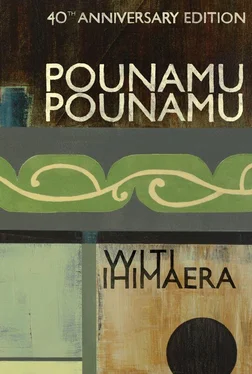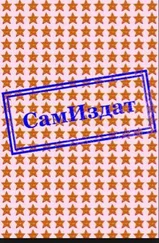‘But that’s favouritism!’
‘No it isn’t. That other team won last year. It wouldn’t be fair …’
‘I know,’ Jerry sighed, ‘… if they win again this year!’
‘There’s another reason,’ I added. ‘Nani Kepa actually can’t see without his glasses. Wasn’t that clever of Nani Marama? I tell you, Waituhi people are cunning as.’ I laughed and patted Jerry on the shoulder. ‘It’s always like this at the beginning, Jerry. After the first rounds are over only the good teams are left, the ones who have really come here to play hockey. As for the rest, well, they’ve come not just because the game’s important but because coming is important. Coming, meeting together, laughing together, having fun together, remembering our family ties, that’s what the tournaments are all about. We have to make the most of these few days we have because, afterwards, it’s back to work, back to life. Back to —’
Yes, Dad, sometimes I do lose track of who I am and what I am. Pakeha life is so seductive.
At that moment there was a roar from the crowd. The opposing team were approaching the Waituhi goal. Alarmed, Nani Marama yelled out to Nani Kepa:
‘Kepa? Hoi, Kepa! You better stop that girl, or else you’re sleeping in the cowshed tonight.’
What else was Nani Kepa to do? After all, Nani Marama was his honeybun. He blew the whistle. ‘Offside,’ he said.
The Waituhi supporters cheered and laughed. The other side started to remonstrate. But Nani Kepa was unmoved. He ordered a penalty hit for Waituhi. Cissie slammed the ball and it sped down the field. Huria picked it up, saw Moana standing in the opposing team’s circle, and lifted the ball to her. However, one of the fullbacks fell on it and wouldn’t get up.
‘Oh, Auntie, please get off the ball,’ Moana yelled.
‘Nope,’ the woman answered. ‘And if you hit me, Moana, I’ll tell your mother.’
Other women crowded around. Nani Kepa tried to get through to see what was going on. One of the Waituhi women tripped him up — and while he was otherwise occupied, Moana reached under her auntie, picked up the ball with her hands and threw it into the goal.
‘Goal!’ Cissie cried.
Nani Kepa got up. What was that? Where was the ball? Oh, was that it in the other side’s goal? How did it get there!
‘Goal,’ Nani Kepa confirmed.
This time, a really huge argument began. The coach for the other side came running onto the field to eyeball Nani Kepa. Laughing, Moana and the Waituhi team came back to the middle of the field to wait out the commotion. She looked at Jerry. He looked at her.
‘Great goal,’ he said.
‘Thank you for letting me use your hockey stick,’ Moana answered.
‘You might even win,’ Jerry smiled.
Moana’s eyes twinkled. ‘Does that really matter?’ she asked.
Then Dad was there. ‘Well, son, we’ve made it through to another year,’ he said.
I thought of my kuia, Miro, and how she had begun the tournament as a way of keeping up our tribal links, one village with the others. You know: the family that plays together stays together. And what’s going to happen when it’s Dad’s turn to go and the sky falls down?
Even so, I smiled at Dad.
‘Yes, Dad,’ I answered.
BEGINNING OF THE TOURNAMENT
Most of the stories in Pounamu Pounamu are set in Waituhi. I was twenty-five in 1969 when I began writing them, after reading a comment by Bill Pearson in a book edited by Erik Schwimmer, The Maori People in the Nineteen-Sixties: A Symposium (1968), that there were as yet no Maori novelists; I decided to give it a go by practising on short stories first.
It was Nani Mini herself who complained when I told her that I had a dilemma — whether or not to give a fictional name to Waituhi, because that would mean that I would have more creative freedom: I wouldn’t have to stick to the correct physical details, think about the whakapapa (genealogy) for my characters, and so on. It was for the protection of Waituhi too, I explained, because there were only around fifty families living there at the time and I didn’t want them to be exposed. She really gave me what-for. ‘Aren’t you proud of Waituhi? Are you ashamed of us?’ Although I finally agreed with her, I did shift her house in the stories to a space where I could disconnect it from the reality. And I did rename the characters I was writing about: for instance, Nani Mini is Nani Miro in the stories. I was quite prepared to share Nani Miro with a reading public, but Nani Mini was mine.
Waituhi, even in 1969, was still a great tribal centre for Te Whanau a Kai, my father’s iwi. It was a well-known Ringatu stronghold, centred on the painted meeting house Rongopai, although none of this dimension exists in the stories — that was to come later in my career. Waituhi was also a centre of cultural competitions and, of course, Maori sporting competitions like hockey. One of my other grandmothers, Nani Teria (she was my ‘real’ grandmother, my father’s mother, and one of the inspirations for Riripeti in The Matriarch ) and her husband Perapunahamoa, plus Nani Mini, Nani George and many others, decided to set up the Maori hockey tournaments on the East Coast at the urging of the great Sir Apirana Ngata. He felt that sport was one way of maintaining all the links between the many small kainga of Poverty Bay and the East Coast. In their heyday, the tournaments attracted between thirty and forty teams and over 500 people. They were huge, boisterous, with lots of kai and dances; and, of course, Ta Api must have known that the tournaments would also encourage unity in other ways … like young men and women from different hockey teams getting married sooner or later.
This story is one that people like to think of as quintessential Ihimaera. In my deck of cards, it showed that I had a strong suit in humour and knockabout comedy, not always something that writers can do. And by the time I came to writing as a career, having that one foot in one culture and the other in another had given me sufficient distance to be able to ‘see’ Waituhi — but through the eyes of the outsider, Jerry.
The story came about when I was at the University of Auckland. Dad rang me up to come home to play in that year’s hockey tournament. The Waituhi team, he said, was short of players. He asked me to bring a friend along, and I took Billy, who became Jerry in the story.
Here I am, sitting on the couch looking at my toenails, and suddenly I’ve remembered Mrs Jones. My wife has kicked me out of the bedroom until I’ve cut my toenails. I must admit that they are long — I haven’t cut them for over two months and they’re curling over the edges of my feet. It’s a shame to cut them though. If I grow them a bit longer, I’ll be able to swing on them. But I better cut them. My wife mightn’t let me back into bed.
Mind you, it’s my own fault that I got caught out. If I hadn’t undressed so far away from the bed, she mightn’t have seen them. When her eyes grew wide with amazement, I’d thought it was a compliment. She’d backed away, a picture of typical feminine defencelessness and I’d advanced and …
‘Get away from me with those claws!’ she’d screamed. ‘Get away, get away!’
They don’t look like claws to me. Boy, anybody would think it was a crime having long toenails. But I’d better get started on them. It’s cold in this sitting room. Here goes.
As I said before, looking at my toenails has reminded me of Mrs Jones and the makutu that was put on her by Mr Hohepa. Makutu is what you would call a magic spell, and Maori people believe that if a person gets a bit of you — it might be some hair, a hanky, even a piece of toenail — he’ll be able to put a spell on you. A makutu. I’d never really believed my mother when she’d warned me always to get rid of my cut hair or toenails myself, to bury them in the garden or burn them, and make sure nobody sees, until I’d actually seen makutu at work. Remembering what happened to Mrs Jones has reminded me to make sure my toenail clippings are hidden safely away. My wife might put a big spell on me.
Читать дальше












